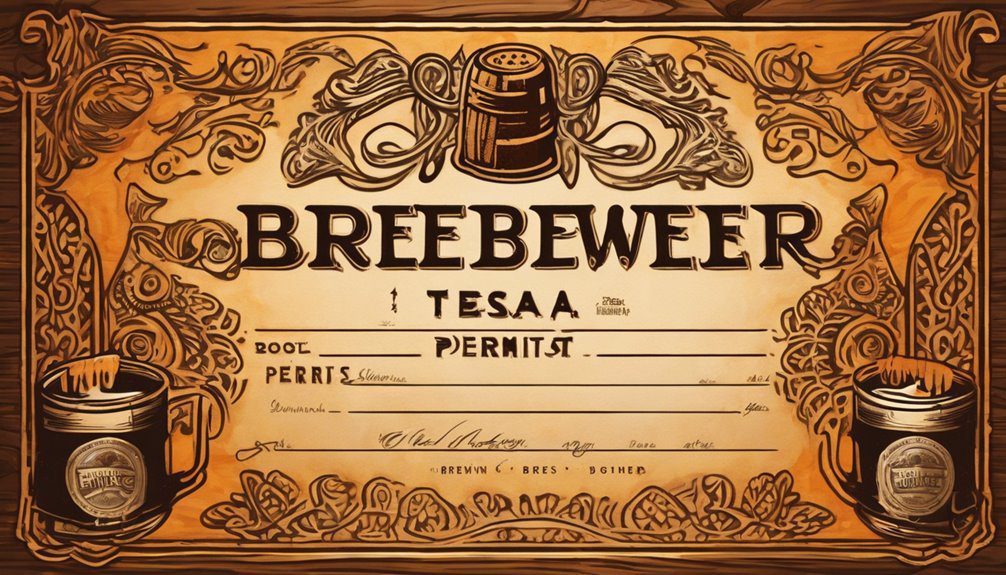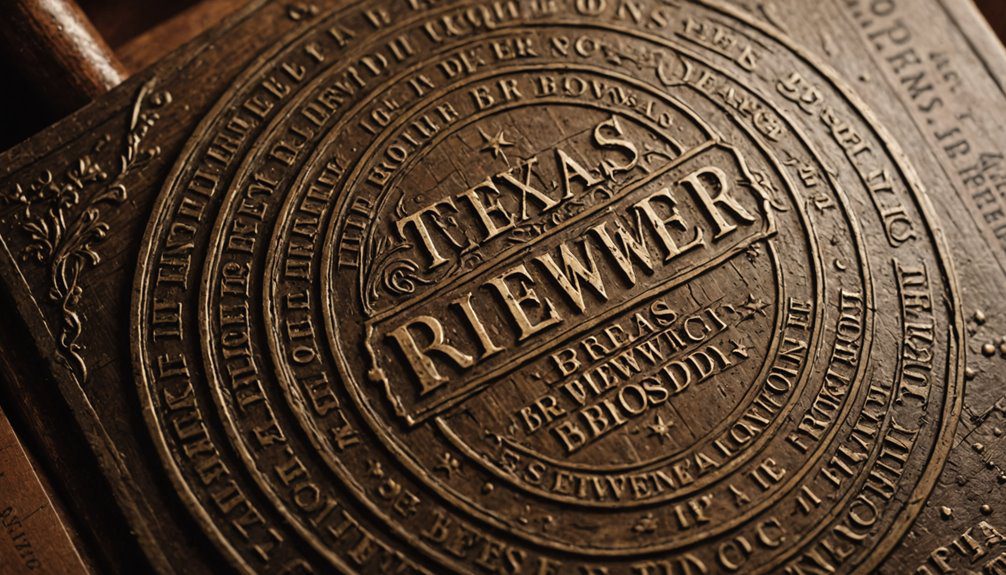If you're considering entering the Texas brewing scene as a nonresident, you'll want to understand the significance of the Texas Fee Interest-Nonresident Brewer's Permit and the accompanying $30,000 bond. This bond isn't just a formality; it's a crucial part of your commitment to comply with state regulations and protect both the state and consumers. Knowing what this entails can shape your approach to compliance and business relationships. But what specific financial implications and benefits come with this bond that could impact your brewing ambitions?
Overview of the Brewer's Permit

If you're considering entering the brewing industry in Texas, understanding the Brewer's Permit is essential. This permit allows you to legally produce and sell beer within the state, making it a crucial step in your brewing journey.
The Texas Alcoholic Beverage Commission (TABC) oversees the permit process, ensuring that all breweries comply with state regulations.
To get your Brewer's Permit, you need to submit an application that includes detailed information about your brewing operation. This includes your business structure, location, and production methods.
You'll also have to undergo a thorough background check, as TABC aims to maintain a secure and responsible brewing environment.
Once you obtain the permit, you'll enjoy certain privileges, such as manufacturing and distributing your beer.
However, it's important to note that the Brewer's Permit comes with specific requirements and obligations. You must adhere to all local, state, and federal laws regarding alcohol production and sales.
Failing to comply can result in fines or even the revocation of your permit. So, stay informed and proactive to ensure your brewing venture thrives in Texas's competitive landscape.
Importance of the ,000 Bond
The $30,000 bond is a critical component of obtaining a Nonresident Brewer's Permit in Texas. This bond serves as a financial assurance that you'll adhere to state regulations and fulfill your obligations as a brewer. By securing this bond, you demonstrate your commitment to operating within the law, which can significantly enhance your credibility with both the Texas Alcoholic Beverage Commission (TABC) and your potential customers.
Moreover, this bond protects the state and consumers from financial losses arising from your business operations. If you fail to comply with regulations or incur any fines, the bond ensures that funds are available for restitution. This not only helps maintain industry standards but also fosters a trustworthy business environment. Additionally, having a $30,000 bond in place can provide assurance of your compliance with regulations, which is a key requirement in the liquor industry.
In addition, having a $30,000 bond in place can make it easier for you to secure partnerships or financing. Investors and suppliers often look for businesses with solid financial backing and regulatory compliance, and the bond signals that you're serious about your responsibilities.
Eligibility Requirements for Nonresidents

Nonresidents seeking a Nonresident Brewer's Permit in Texas must meet specific eligibility requirements to ensure compliance with state regulations.
First, you need to be at least 21 years old. This age requirement is crucial for anyone involved in the production or sale of alcoholic beverages. You also need to demonstrate that you have a valid business entity registered in your home state or country.
Next, you must prove that you have the financial stability to operate a brewery. This often involves providing documentation that showcases your business's financial health, such as bank statements, tax returns, and balance sheets.
Additionally, you'll need to establish that you aren't currently violating any alcohol-related laws in your home jurisdiction.
It's important to note that you may also be required to show proof of good standing with the Texas Comptroller of Public Accounts.
Failing to meet these eligibility criteria can lead to delays or denial of your permit. Understanding these requirements can help streamline your journey toward obtaining your Nonresident Brewer's Permit in Texas and ensure you're ready to navigate the next steps in the application process.
Application Process for the Permit
To apply for a Nonresident Brewer's Permit in Texas, you'll need to follow a structured process that includes submitting several key documents and forms.
First, you should complete the application form, which provides essential details about your brewing operations and business structure. Make sure to gather your identification documents, including a valid driver's license or passport.
Next, you'll need to submit proof of ownership or a lease for your brewing facility, along with any required local permits. It's also crucial to provide a detailed description of your brewing equipment and production capacity.
Once you have all these documents in order, you'll submit them to the Texas Alcoholic Beverage Commission (TABC).
Don't forget to pay the application fee, which is typically required at the time of submission. After you submit your application, you may need to attend an interview or inspection process, so be prepared for that.
Financial Implications of the Bond

When applying for a Nonresident Brewer's Permit, understanding the financial implications of the required bond is crucial. The $30,000 bond acts as a safety net, ensuring compliance with Texas regulations.
You'll need to budget for the bond premium, which is typically a percentage of the total bond amount. This can vary based on your creditworthiness, so it's wise to shop around for competitive rates from different surety companies.
Additionally, if you ever make a claim against your bond, it could lead to increased premiums when you renew. You should also be aware that while the bond is a one-time requirement for the permit application, it needs to be maintained for the duration of your permit.
This ongoing financial commitment can impact your operating budget, so plan accordingly.
Moreover, if you're unable to meet the bond obligations, it can jeopardize your ability to operate legally in Texas, leading to potential financial losses.
Therefore, you must factor in these costs when considering your overall expenses related to brewing operations. Keeping these financial implications in mind will help you navigate the process more effectively and ensure your business remains compliant. Additionally, understanding the specifics of Texas Surety Bonds is essential to avoid any pitfalls in your application process.
Compliance and Regulatory Obligations
Understanding your compliance and regulatory obligations is essential for successfully operating under a Nonresident Brewer's Permit in Texas. You'll need to familiarize yourself with the Texas Alcoholic Beverage Commission (TABC) regulations, which govern the production, distribution, and sale of alcoholic beverages. This includes adhering to laws regarding labeling, advertising, and marketing your products.
You must also maintain accurate records of your brewing activities, including inventory and sales, to ensure transparency and facilitate inspections. Regular reporting to TABC is crucial, as failure to submit required documentation on time can lead to penalties or permit revocation.
Additionally, it's important to stay updated on local ordinances, as they can impose specific requirements that may vary by city or county. Engaging with legal counsel or a compliance expert can help you navigate these complexities.
Don't forget about employee training; ensuring your staff understands the laws surrounding alcohol service can help prevent violations.
Benefits of the Permit

Securing a Nonresident Brewer's Permit in Texas offers numerous advantages that can significantly enhance your business. With this permit, you gain access to one of the largest craft beer markets in the United States. This means you can tap into a growing consumer base eager for diverse and unique brews, increasing your potential sales and brand recognition.
Additionally, having this permit allows you to legally manufacture and sell your beer in Texas, ensuring you comply with state regulations. This legitimacy not only fosters trust among consumers but also opens doors for partnerships with local bars and restaurants, expanding your distribution channels.
Moreover, you'll have the ability to participate in various beer festivals and events across the state, showcasing your products to a wider audience and building your brand's reputation. Networking opportunities abound, allowing you to connect with other brewers and industry professionals.
Resources for Aspiring Brewers
As you embark on your brewing journey, tapping into various resources can significantly enhance your skills and knowledge.
Start with brewing books like "The Complete Joy of Homebrewing" by Charlie Papazian or "How to Brew" by John J. Palmer. These texts offer foundational techniques and recipes to get you started.
Online communities are invaluable as well. Join forums such as Homebrewtalk or Reddit's r/Homebrewing, where you can ask questions, share experiences, and learn from fellow brewers.
YouTube channels dedicated to brewing, like "The Homebrew Academy," provide visual guidance on processes that can be hard to grasp through text alone.
Consider enrolling in local brewing classes or workshops. Many homebrew shops offer hands-on experiences, allowing you to learn directly from industry professionals.
Attending beer festivals and tasting events can also broaden your palate and deepen your understanding of different beer styles.
Conclusion
In summary, obtaining the Texas Fee Interest-Nonresident Brewer's Permit and securing the $30,000 bond is crucial for your brewing business's success. It not only shows your commitment to compliance but also opens doors to partnerships and financing opportunities. By understanding the eligibility requirements and application process, you'll be well on your way to establishing a reputable presence in the Texas brewing industry. Embrace this opportunity, and you'll set yourself up for growth and trust within the market.

